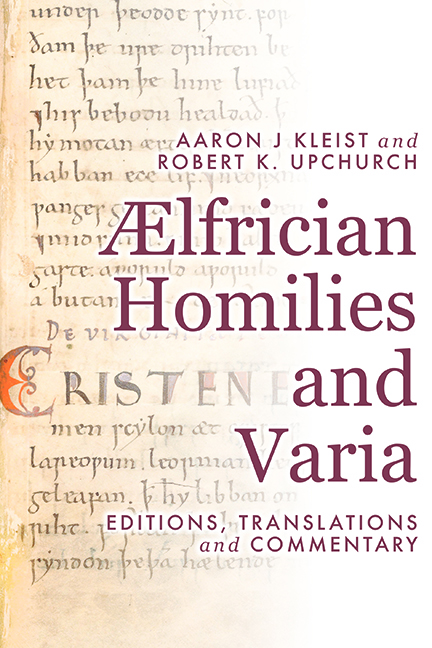Book contents
- Frontmatter
- Contents
- Preface
- Acknowledgements
- Abbreviations
- Sigla for Cited Ælfrician Manuscripts
- Dates for Cited Ælfrician Works
- Editorial Conventions
- Conventions Used in the Commentaries
- Homilies The Proper of the Season
- Homilies The Proper of the Saints
- Ælfrician Homilies and Varia: Editions, Translations, and Commentary: Volume II
- Homilies The Common of the Saints
- Homilies Unspecified Occasions
- Varia
- Works Cited
- Index
- ANGLO-SAXON TEXTS
4 - Friday after the Fifth Sunday in Lent: Collegerunt ergo pontifices (‘The Chief Priests Therefore Gathered’ [John 11.47–54])
Published online by Cambridge University Press: 05 March 2024
- Frontmatter
- Contents
- Preface
- Acknowledgements
- Abbreviations
- Sigla for Cited Ælfrician Manuscripts
- Dates for Cited Ælfrician Works
- Editorial Conventions
- Conventions Used in the Commentaries
- Homilies The Proper of the Season
- Homilies The Proper of the Saints
- Ælfrician Homilies and Varia: Editions, Translations, and Commentary: Volume II
- Homilies The Common of the Saints
- Homilies Unspecified Occasions
- Varia
- Works Cited
- Index
- ANGLO-SAXON TEXTS
Summary
Collegerunt ergo pontifices (‘The Chief Priests Therefore Gathered’) is Ælfric's homily for the Friday of the fifth week of Lent. It stands last in the sequence of pericope homilies that he wrote for the five Fridays in Lent before Good Friday and expounds John 11.47–54, a passage directly following the raising of Lazarus that was the subject of the homily for the fourth Friday (AH I.3). Our editorial title is taken from the incipit of John 11.47, which begins the account of the meeting of the chief priests and Pharisees at which the high priest Caiaphas prophesied that Jesus would die for the Jewish nation. According to John's account, that meeting also set in motion the plot to kill Jesus, who withdrew from Jerusalem until his return on the Sunday of Passover week, at the end of which he would be crucified. Liturgically speaking, Collegerunt ergo pontifices is Ælfric's final homily prior to Palm Sunday two days later, when the commemoration of Jesus’ triumphal entry into Jerusalem marks the beginning of Holy Week.
Ælfric begins with a close translation of the day's pericope [lines 1–27] and commences his exegesis by identifying Lazarus’ resurrection as the catalyst for the council's plot [lines 28–41]. He had commented at length on the miracle in Lazarus (AH I.3), and as was the case with that homily, Augustine's Tractates on the Gospel of John guide his interpretation here. He links the ‘foolish presumption’ (dyslic dyrstignys [line 36]) of the leadership's desire to kill Lazarus [lines 36–41] to the plot to put Jesus to death, a plot ultimately foiled when the Crucifixion resulted in the redemption of mankind [lines 42–66]. This ironic reversal prompts Ælfric independently to adapt for this homily the account of the siege of Jerusalem he had written earlier (CH I.38) since the siege, he says, depicts the judgment the chief priests and Pharisees had hoped to avoid by killing Jesus [lines 67–96]. He also underscores the irony of Caiaphas’ prophecy that Jesus would die to save the Jewish nation when, in fact, his death would create a new nation of Jewish and Gentile believers in the Church [lines 97–127].
- Type
- Chapter
- Information
- Ælfrician Homilies and VariaEditions, Translations, and Commentary, pp. 293 - 322Publisher: Boydell & BrewerPrint publication year: 2022



